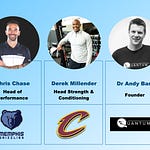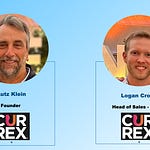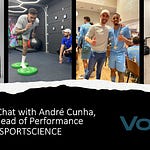This week, we had the honor to interview Dr Andy Barr, consultant for the Brooklyn Nets, a top NBA team. Andy is also the Founder of Quantum Performance and previously worked for the NY Knicks in the NBA, NYFC in the MLS, Manchester City, the Saints, Bolton in the Premier League.
📝Show Notes: Throughout this interview, we touched on Andy's background, his role with the Brooklyn Nets. We also touched on the importance of load management and sleep management. Then we talked about his favorite technologies and the type of technology that he would build if you had unlimited engineering resources and funding. Lastly we talked about what makes Kevin Durant, one of the best basketball players in the world, so special.
Best Quotes: Here are some of the key discussion points and best quotes from our conversation with Andy:
On his background:
“I'm a physical therapist and strength coach. I also have a masters in sports science. I actually started my career as a professional soccer player, and I left home at 15 to do an apprenticeship with Luton Town. I was there for three years, I had a pro contract, but I was unfortunate with injuries, and I played in non-leagues while I trained as a physiotherapist. Fortunately the players union really take care of their players and supported me all the way through. And pretty much straight out of the university, I got a job as a physio with Bolton Wanders who were in the Premier League and it was a great foundation for me because they were leading the forefront of sports science and medicine at the time. It was really great for me to have that as my first experience as a member of staff in a small environment, where I built a lot of great contacts and friends there. Today I still keep in touch with a lot of the guys during that period from 2000 to 2007.
“Then from there I moved on to work with Southampton FC and also Manchester City FC. My philosophy has always been to have a more proactive approach, where I am trying to help reduce the risk of injury and look at all the different factors around that, with my main area of interest being movement, biomechanics and action training that relates specifically to sport”.
“Then from there, I wanted to have a new challenge and work in the US. So I got offered a role with the New York Knicks in 2009, where I had some great years there. I worked there for about six years and then I decided to transfer back into soccer. So I worked for New York City FC for a couple of years, where I helped set up their sports medical department in their inaugural season”.
On how he ended up launching its own business Quantum Performance:
“Then I wanted to actually just expand my scope of a practice in terms of who I could work with multiple different athletes. So, I decided to set my own business up and move to LA where I knew as a place where a lot of athletes go to do off season rehab, training and recovery”.
“That's when I developed Quantum Performance and started doing consultancy with different teams and individual athletes. I've been doing that for the last six years now. Part of the consultancy that I've been doing more recently was with the Brooklyn Nets”.
On the main differences between working for a soccer team Versus working for a basketball team:
“In soccer, you might do one to two games a week but in basketball it can be 3-4 games. Obviously the soccer games are longer and more demanding physically, and it takes more toll on the body, but you get more recovery time in between and there's less travel and expectations to play in a fatigued state. So, when I worked in soccer, it was very rare that you were up late the night before and then playing a game. Whereas in the NBA, we might get into a city at 2:00 or 3:00 AM and then the players are expected to perform that same day. They get up, they recover as best they can, they might have a nap in the afternoon and then they're out playing and they fly out to the next city. Maybe there's a day of recovery and then they get onto the next city. So if you did a West Coast swing, for instance, you're on the road for maybe 10 or 11 days, you might play four or five games in different cities, maybe back-to-back. So, the intensity of that schedule and then the fatigue that builds and the grind was a big difference to what I found working in soccer”.
“Then also you have the ability in soccer to develop fitness through the season. And you have more opportunity to do that because you can prioritize, especially if you're not playing two games a week, where you can actually have an impact through the week. Whereas in basketball, it's just more about maintenance, freshness and recovery, and that's a constant cycle of that”.
On how he ended up working for the Brooklyn Nets (NBA):
“I decided to set my own business up in LA, where I could be a little bit more available to different sports and multiple athletes. And just through my network and my experience of working with a lot of top athletes and elite athletes, when Kevin Durant got his Achilles injury, the Nets reached out to me and asked if I would help with his rehab process. One, because he comes to LA a lot and just two, because of my experience working in the NBA and my reputation. So, that's how I got involved to start with and helped him through his rehab. So I've been working with them as a consultant ever since, for the last two and a half years now”.
On the importance of load management:
“I think, load management is like a loosely used term. It's overused and I think keeping players fresh and available is essential for any coach working with a team. So, that's obviously the goal. Freshness allows them to perform optimally. When we say freshness, it's not just physiologically, it's psychologically. So, when we look at load it's like, what is the load and what are we looking at? And what are the ingredients that are applied to load management, and why do we need to manage load for freshness? We need load for adaptation too, for growth and for improvement. So, I think, when we say load management, it's really like game management, like team playing management, and that's the starting point.
“If we start with the game and playing time and understanding, that is the most important thing. The coaches are determining whether the players are fresh from how we observe their performance. And then we look at what information we have to support what we're finding. I think that's a better way to look at it. But load management, sleep and recovery, especially in the industry that I'm more recently familiar with, in basketball, is extremely important because, if the players aren't fresh, they're under-recovered, and they're overloaded excessively, which can lead to potential injury and obviously drop off in performance. It's a performance sport, so we want to make sure that we're doing everything we can to keep the players fresh, but knowing what can cause overload is key and it's not just physiologically or external load that we should be looking at. There's a lot of other factors that we need to take into consideration and unfortunately, we can't always measure them all”.
On the importance of sleep management:
“I think sleep is the number one thing for recovery and sleep deprivation is really impactful on your performance. So, the better quality and quantity sleep that you can get is really a factor, or knowing strategies to aid when you can't get the hours of sleep, is really important too. So, I think, I like the technologies that you're talking about in terms of allowing for better optimized sleep and just giving strategies to help athletes manage better sleep and improve the quality based off of the environments that they're in. I love that, I think that's really important. What can be a hindrance sometimes though is technologies that inform athletes when they've had a bad sleep or they're not ready. And then it's like, "Well, I've got to play tonight. Now I've got that in the back of my head, what am I going to do about it?"
“As soon as you don't sleep well, it's like the brain hasn't been cleaned, so you become more sluggish. You don't make as good a decisions. You don't recognize things quickly. You experience things differently. You experience fatigue quicker, fatigues and experience pains, you experience that on a heightened level. It can really affect with chronic pain. It's like there's a filter that goes into your brain and the information that's coming in from outside of the outside of the body and inside the body, that is opened up and you just get much more information coming in. Then it's a lot harder for you when you did not get enough sleep (..) But when you're sleep deprived, it's a lot harder and you become distracted and more sensitive to pain, more sensitive to what people are saying. So there's all those factors, more sensitive emotionally”.
On the importance of technologies:
“We use technologies for monitoring player health, giving better insights, for tracking external load and internal load. So, there's many different uses for it. But as I said before, the biggest problem I think, is often having the technology as your objective reference and the numbers that tech gives you and then if you use that as your objective reference, then you only work towards the technology data. When really, it's just data, and it's just an ingredient from a bigger context that needs to be understood”.
“I love technology, but I don't start from the bottom up when I look at technology and look at what the technology provides. I start from the top down, I look at what the game is, the context, the environment, and then I see where the technology can provide insights into certain characteristics of the game or of the environment that I'm in, to help make more informed decisions. But that isn't my objective reference that I need to train towards”.
“But I feel like there's not enough of it driven by the practitioners, from the top down, and I think sometimes the game and the nuances of the game are lost because of the numbers and the technology. I think we can do a better job at starting or understanding, where it fits from the game reference, and then we'll get more effective use out of it. Then I think there'll be a better application as well in the future”.
On the importance of communication within a pro team:
“From the highest level, it's communication, understanding, strategy, and being able to communicate with the environment and then communicate internally. Can you measure that? That's the most important in team sports, so can you measure that with technology? Not yet. Decision making, that's the next one, the best players make the best decisions and the best players are great communicators, but the sad thing is nowadays, our communication skills are really just going to technology too much. In a team environment now it's shocking when you're in a locker room, or when you're around a team and everyone's just on their phone, looking at their phone”
“Can you measure decision making well, and are we taking that into consideration? The psychological factors really are the biggest influence of success within the team sport. But often what we look at is skill, which we can measure, technical outputs, and then also fitness, which we can get some insight, which is often inaccurate, but we can get some insight with GPS data”.
The way that the strategy of the game is played at times can really influence the data, and if you don't know that context, then you can make decisions based off of the data when actually, it's just the way the game was played for that instance”.
“And often, there's a confusion between the decision making, execution and the actual fitness levels. And sometimes it's just poor decision making. It's nothing to do with execution and fitness. It's just a poor decision and communication. So, it's more of a strategic or a play development on decision making that needs to be improved or monitored. And understanding that context really helps with getting a better understanding of the overall outcome of what needs to be worked on with that player”.
“Knowing that players will be playing in a loud arena which might be a factor in he game, is huge and that's going to affect the psychological performance. So, maybe there's ways you can train the psychology of the athlete, or create an environment that's more stressful when they're training. So, it's like knowing what their environment is and what they're exposed to is helpful for when you bring an athlete back or when you train athletes”.
On his favorite technologies:
“Outside of my phone and my laptop, I do like some of the GPS technologies that we use to give some insights. I think that's helpful in the right context. We also use technologies like KangaTech, which also provide information in the weight room for monitoring. I like forced plates, that type of technology to give insights into how players are. Technologies like that are very helpful. I think that they help with monitoring and just understanding, where a player's at.
“Then there's another technology that I've been recently working with, that I've developed, which is a biofeedback tool, which allows the athlete to train movements that relate to their game in real time. Using computer vision and sensors you can track how the players are moving at every joint in all three planes of motion, and they can see how they're moving in real time on the screen. You set thresholds, which allows them to get that biofeedback and to improve the quality of their movement in relation to an action that they might do on the court. If there's a problem that they've found on the court and they want to try and work on that, or if they're coming back from an injury, it's really good to get baselines on those type of things that they need to be able to do when they're playing on the court. So, I use that technology quite a bit. I really enjoyed using that, and the players get a lot use out of it”.
“You're better off just having three or four technologies that you can hang your hat on, that fit really well within your culture, that provide you with information that you can understand within the context of your sport, that really allow you to make good or more informed decisions. So, you're better off having fewer that you make more use out of the information than having lots of different tech, just to say you have it, but not really have any impact with the information that you get from it”.
On the type of technology that he would build if he had unlimited engineering resources and funding:
“I think just going back to what we were discussing before, a technology that helps really develop and provide greater insights into game-specific context. So, communication and decision making and understanding that better in real time and also having a way to make that more tangible so we can develop better communication, decision making of the athletes, because that's what leads to everything else, right?”.
So, I think having a bigger focus on stuff that creates simulations and improved communication and also quality, are important. I feel like that's why I have a big fascination with AR and VR. I think what that's going to provide are some of these instances, with the ability to interlink computer vision and getting more understanding of how people are moving and performing, in context of the situations of real life and in the game, and then being able to develop that and have more impact in those areas”.
“Technology's evolving, we're evolving. You've got to accept that. Screens are part of our life, it's only get more and more, but then how do we build our tech to then help with improving communication in a way where we can still interact and there's less miscommunication. So I think, thinking about that as a way for the future, I think will be really valuable”.
On what makes Kevin Durant such a special player:
“He loves the game. I've never seen anyone love the game as much as him, he's just obsessed with it. He's just obsessed with basketball. He'd be playing every day if he could. He would not take a day off, so you have to force him. I mean he does now. He definitely is smart with his recovery, but what he does now is he is more efficient. When I say efficient, he trains with 100%. Everything he does is with 100% and intent and as soon as he's on that court, it's like, "I'm going to maximize this session and then I'm going to recover." Rather than just putting up shots half fast, and just doing things half fast, and I think you're working hard because you're there for a long period of time and not really having much output. It's not about how long you're doing it for. It's about what you're doing and the quality of what you do it with and his obsession with the game and the quality of effort and the intensity that he puts in, is astounding”.
On the fact that sometimes top athletes want to play all the time and don’t want to take days off:
“That can be a blessing and a curse because sometimes they're great in spite of that, it's like that's what they think they need. Because everybody needs to recover but at the same time, that's why they're so driven. And they're prepared to push themselves beyond the limits, especially earlier on in their career and go through that pain, to then really develop and grow and be able to cope with all different situations in certain environments. But then, that's not sustainable and that's when you start to see if you keep doing that, then you get injuries. So, you can endure that for a certain period of time, but then you've got to be smart”.
“If you want longevity, you've got to be really smart with how you manage yourself. It's less about the volume and more about the intensity. Everything should always be train how you play (..) Manage where you put your effort and then where you do put your effort, give 100% and then just sharpens your tools and without fatiguing yourself.”
Of note, you can contact Dr Andy Barr through his website at www.quantumperformance.co or on social media at twitter or Instagram @andybarrPT
You may also like:
⭐Sports Performance Roles & Best Practices (Head of Performance, Head Athletic Trainer..)
🔮 2022 Upside Top Sports Tech Predictions (NFT/Metaverse, Sports Performance, IPOs/M&As..)
🔗 🔥 Upside Analysis: NFTs Vs Crypto Vs Digital Currency, How Are They Different?
🔥 Upside Chat: Dave Hancock, CEO, Apollo (Leading Athlete Management Systems (AMS) vendor)
🔥Upside Chat: Alexi Pianosi, Strengths and Conditioning Coach, Pittsburgh Penguins (NHL)
🔥Upside Chat: Pierre Barrieu, High Performance Director, Toronto FC (MLS)














🔥 Upside Chat: Dr Andy Barr, Consultant, Brooklyn Nets (NBA) & Quantum Performance Founder